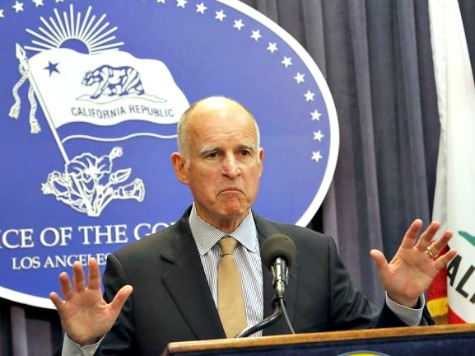Covering for California governor Jerry Brown, the California legislature has allotted $250 million gleaned from “cap-and-trade” greenhouse gas fees on businesses to make it look as though Brown’s bullet train is still a viable idea.
But as Dan Walters notes in the Sacramento Bee, the money is a fig leaf that barely disguises the fading chances of Brown’s plans for the train ever coming to fruition.
Walters points out that, although the agreement from the legislature states that the state’s budget will give the train project 25 percent of the greenhouse gas future fees, the huge $68 billion cost for the train makes the proposed influx of cash virtually meaningless. Walters also notes that the $68 billion figure is probably a low estimate.
What the $250 million will do is make it possible for the train project to skirt a court-ordered freeze on state bond funds and allow the project to start meeting the state’s demand that it match federal funds meant to lay the beginning of unelectrified track in the San Joaquin Valley.
Walters asserts that the $250 million buys Brown and his pals pushing the bullet train some time:
. . . it buys Brown and his appointees on the High-Speed Rail Authority some temporary breathing room while they fight multiple lawsuits – and some adverse rulings – contending that the project doesn’t meet the seemingly strict conditions laid down in the 2008 authorizing bond measure.
But Walters argues that depending on the cap-and-trade money may be risky because the legality of that money is being contested in court, and even if the cap-and-trade money is legal, it is a pittance compared to the cost of the project.
The total from the cap-and-trade money over the next 15 years would approach $7 billion to $10 billion, but even when bond money and federal funds would be added, would not come close to matching the cost of the project. The rubber would meet the road because the project cannot proceed under law unless the total financing for the 300-mile, $31 billion “operating segment” from Merced to Los Angeles is in place.
Walters concludes with two more dark notes for the bullet train’s future: Bakersfield Congressman Kevin McCarthy, the likely new Majority leader in the House, is adamantly opposed to the bullet train, and thus may not approve giving the project any funds; and the California voters are souring on the idea of the train, as implied by the fact that four Democratic representatives who are up for reelection have supported a Republican amendment to stop funding the bullet train.

COMMENTS
Please let us know if you're having issues with commenting.